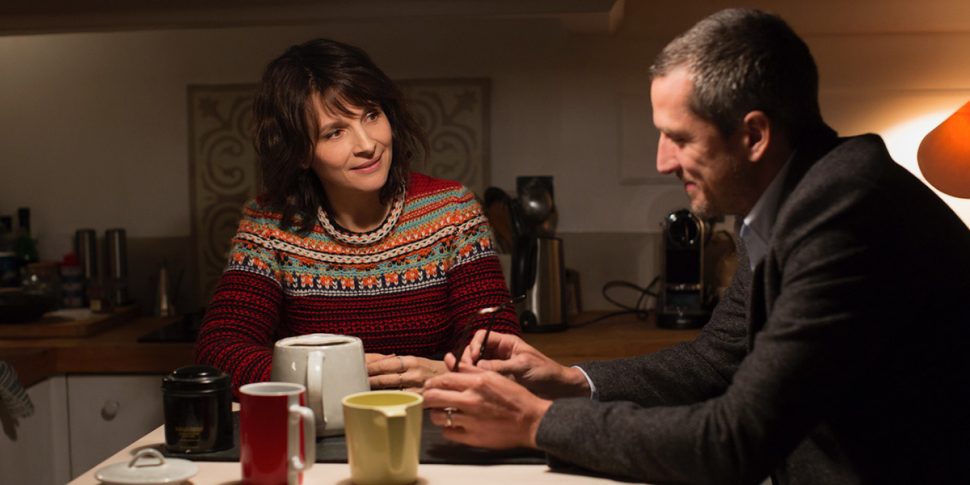From pseudo biopics like “Colette” and imagined biopics like “Roma” to inspired-by-true-events films like “Viper Club” and “Cold War,” the dichotomy between the real and the imagined seemed of recurring value throughout TIFF 18. The philosophical debates between what we perceive and what exists are millennia old, and precipitate a feeling of rote deference and fealty to a topic that’s of great value but rarely entertaining. And, yet, despite its very deliberate inclinations towards philosophy and critical theory, Olivier Assayas’ “Non-Fiction” has endured as the funniest film I saw at TIFF 2018. And, it’s not “funny with a caveat” but a genuine funniness borne out of a sincere, and joyful, interest in things that at first seems too deliberate, too cerebral, and too effortful to be handled as warmly as they are in this irreverent paradox of a film.

“Non-Fiction” is a story about Alain, a successful book publisher dealing with the ins and outs of his professional and personal life. Except, it’s probably more about Alain’s volatile relationship with his friend, and client, Léonard, whose increasingly solipsistic books begin to infuriate Alain. Except, it’s probably about how Alain’s relationship with his wife, an actress, stands to represent the changes (both avoidable and unavoidable) that the media landscape is experiencing in the 21st century. “Non-Fiction” juggles a few things. It’s French title, “Doubles vies” (Double Lives) is perhaps more accurately indicative of the world these characters inhabit, where a thing is never just one thing.
On some level, the cerebral arguments in “Non-Fiction” might seem too quaint to be provocative, or too obvious to be significant, except as the second of 45 features I saw at the festival it was interesting how Assayas’ sly commentary on art and life seemed to be reflected in the films throughout the rest of the festival. For example, there’s a moment in the delightfully arch “Colette” when Keira Knightley’s Colette remarks, “I am the real Claudine,” referencing a string of books that should have brought her fame, but for the fact that the true author was hidden. It’s the same question of reality seeping into fiction that I suspect might follow Alfonso Cuarón’s “Roma” as it moves through the awards season. I’ve already overheard discussions on Cuarón’s ability or right to tell this story of his childhood maid. Who gets to use who in their art? It’s the very question that is posed to Léonard in “Non-Fiction,” who at first comes off as more despicable than he is. Léonard has a habit of writing scandalous tales of his past relationships into his novels, with little fictionalising. His latest follows the same trend, except the affair he’s writing of is not the one everyone thinks he’s writing about. “I write auto-fiction,” he purrs in an interview. What exactly is auto-fiction, the interviewer seems to wonder. We’re not too sure either. It’s a cop-out, but a hilarious one, when Léonard argues that anyone he comes into contact with becomes part of his life, and therefore is fair game for his fictive realities.
Hence the title, “Non-Fiction,” but not NOT fiction either. It’s one reason the title English title is so amusing. In a scene, we watch Alain’s wife, Selena (Juliette Binoche) performing in her lucrative, but bland TV show as a crisis management expert. The moment has layers. There’s the purely textual, as we’ve recently learned that Juliette isn’t quite as fond of her job as you might imagine. She’s a celebrated theatre actress. She’s uncertain whether the popularity the show affords her is worth it. There’s also an added meta-commentary in watching the very artistically vibrant Binoche in a cop show. Assayas knows his audience well so a late-in-the-film joke that riffs on the real Juliette Binoche is an absolute irreverent delight, sustaining the biggest laughs from the audience.
There is an element of the purely academic here. The film flirts with pedagogy, critical theory and academia in ways that had me nostalgic for similarly endless discussions at university. But, “Non-Fiction” is never remote in its interest in knowledge. The jokes move from Adorno and Michael Haneke to “The Force Awakens” and Taylor Swift. Ebooks are fair game, as is Twitter. What makes “Non-Fiction” such a joy is that Assayas does not isolate himself to concepts and things. For all the talking points that come up (the first half of the film is very talk-heavy), when things settle down, it’s the weird bizarre people in all their silliness that he pledges allegiance to. It’s there in the way he shoots conversations, journeying off from what seems to be the focus to odd idiosyncrasies of the characters listening on. French comedienne Nora Hamzawi is the best at this. Her deadpan responses throughout the film are an asset to the drollness the film demands.
It’s telling that the credits roll on a couple’s embrace that emphasises the carnal over the cerebral. Like many philosophical discussions, “Non-Fiction” never seems to show its hand and come to a real conclusion, but it’s hard to care when the entire thing is so much fun.

